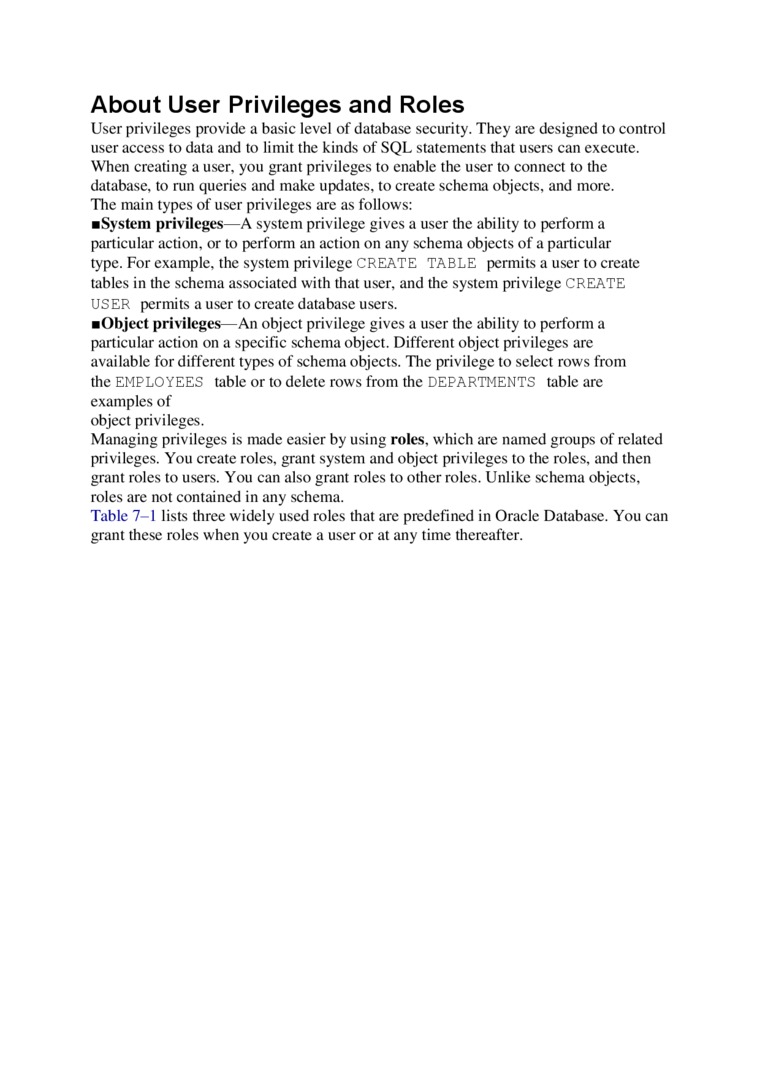79701

About User Privileges and Roles
User privileges provide a basie level of database security. Thcy arc designed to control user access to data and to limit the kinds of SQL statements that users can exccutc. Whcn crcating a user, you grant privilcges to cnablc the user to connect to the database, to run querics and make updates. to create schcma objeets, and morę.
The main typcs of user privileges are as follows:
■System privileges—A system privilegc gives a user the ability to perform a particular action, or to perform an action on any schema objeets of a particular typc. For cxamplc. the system privilcge CREATE TABLE permits a user to create tables in the schema associated with that user, and the system privilege CREATE USER permits a user to create database users.
■Object prmleges—An object privilege gives a user the ability to perform a particular action on a specific schema object. Different object privileges are available for different types of schema objeets. The privilege to select rows from the EMPLOYEES table or to dclctc rows from the DEPARTMENTS tablc arc examples of object privileges.
Managing privileges is madę easier by using roles, which are named groups of related privileges. You create roles, grant system and object privileges to the roles, and then grant roles to users. You can also grant roles to other roles. Unlike schema objeets, roles are not contained in any schema.
Tablc 7-1 lists three widely used roles that are prcdefined in Oracle Database. You can grant these roles when you create a user or at any time thcrcaftcr.
Wyszukiwarka
Podobne podstrony:
3 New Series No. 96 and control are concerned, is simply a delegation of the Government in London --
About Administration Privileges for Startup and Shutdown To start or shut down thc Oracle instancc,
About User Accounts For users to access your database, you must crcatc user accounts and grant appro
User Application Provider Application ~r Application —
About Tables The table is the basie unit of data storage in an Oracle database. It holds all user-ac
About Generic Terms and Abbreyiations Unless otherwise stated, this textbook uses the following abbr
Tax Avoiding Companics in ilu* UK Somc mtcrcMing dala about largo nmltinationaU and the aroount of U
26 A. ajczak silted-up, and also the shallow reservoirs on mountainous, upland and lowland rivers, i
SAVE0360 Tell me about itLesson 18Promises and resolutions 1 Czy podejmujesz posta
screenshot 3 1 Video User Manuals + New Howdy. editor
WP 140521�5 5. Read the text about China’s piracy and choose from the words the one which best fit
067 bird Fringe Art Project: BirdMaterials Needed: bird patterns, two wings and taił pattern (patter
About Advisors Advisors arc powcrful tools for database managcment. Thcy providc spccific advicc on
About Software Management and Patch Releases Software management involves kccping your Oracle Databa
więcej podobnych podstron